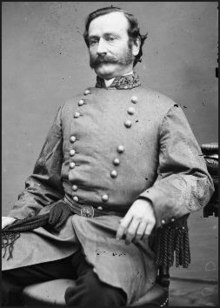Mansfield Lovell
| Mansfield Lovell | |
|---|---|

Mansfield Lovell
|
|
| Born |
October 20, 1822 District of Columbia |
| Died | June 1, 1884 (aged 61) |
| Allegiance |
|
| Service/branch |
|
| Years of service | 1842–1854 (USA) 1861–1865 (CSA) |
| Rank |
|
| Battles/wars | |
Mansfield Lovell (October 20, 1822 – June 1, 1884) was a major general in the Confederate States Army during the American Civil War. As military commander of New Orleans when the city unexpectedly fell to the Union Navy in 1862, Lovell was fiercely criticised by local citizens for failing to predict a naval invasion. The Confederate government also heaped blame on him, to deflect attention from their own error in leaving so few troops to defend the city. A Court of Enquiry later cleared him of charges of incompetence, but his reputation never recovered.
Lovell was born in the District of Columbia. His father was Joseph Lovell, the eighth Surgeon General of the United States Army. His great grandfather, James Lovell, was an active member of the Whig organization in Boston before the American Revolution, and was a member of the Continental Congress from 1777-1782. He was one of the prime movers in the scheme to supplant General George Washington as commander-in-chief by General Horatio Gates and an original member of the Massachusetts Society of the Cincinnati.
Lovell graduated from the United States Military Academy in 1842 and was commissioned as a second lieutenant in the U.S. artillery. He was severely wounded at Belén Gate during the Battle of Chapultepec in the Mexican-American War, receiving a brevet appointment to captain for his service in that battle. After serving on a variety of minor posts, he resigned from the army in 1854 to join the abortive Cuban expedition of General John A. Quitman. He then moved to New York City, where he engaged in business and served as deputy street commissioner.
...
Wikipedia
